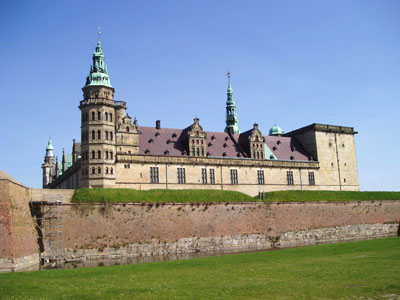Hamlet
is a tragedy by William Shakespeare, believed to have been written between 1599
and 1601. The play, set in Denmark, recounts how Prince Hamlet exacts revenge on
his uncle Claudius, who has murdered Hamlet’s father, the King, and then taken
the throne and married Hamlet’s mother. The play vividly charts the course of
real and feigned madness—from overwhelming grief to seething rage—and
explores themes of treachery, revenge, incest, and moral corruption. The
protagonist of Hamlet is Prince Hamlet of Denmark, son of the recently deceased
King Hamlet and the nephew of King Claudius, his father’s brother and
successor. After the death of King Hamlet, Claudius hastily marries King
Hamlet’s widow, Gertrude, Hamlet’s mother. In the background is Denmark’s
long-standing feud with neighboring Norway, and an invasion led by the Norwegian
prince, Fortinbras, is expected.
The play opens on a cold night at Elsinore, the Danish royal castle. The sentinels try to persuade Hamlet’s friend Horatio that they have seen King Hamlet’s ghost, when it appears again. After hearing from Horatio of the Ghost’s appearance, Hamlet resolves to see the Ghost himself. That night, the Ghost appears to Hamlet. He tells Hamlet that he is the spirit of his father, and discloses that Claudius murdered King Hamlet by pouring poison in his ears. The Ghost demands that Hamlet avenge him; Hamlet agrees and decides to feign madness to avert suspicion. He is, however, uncertain of the Ghost’s reliability.
Busy with affairs of state, Claudius and Gertrude try to avert an invasion by Prince Fortinbras of Norway. Perturbed by Hamlet’s continuing deep mourning for

Kronborg
Castle, Elsinore, from the play Hamlet
his
father and his increasingly erratic behavior, they send two student friends of
his — Rosencrantz and Guildenstern — to discover the cause of Hamlet’s
Polonius
is Claudius’ trusted chief counselor; his son, Laertes, is returning to
France, and his daughter, Ophelia, is courted by Hamlet. Neither Polonius nor
Laertes thinks Hamlet is serious about Ophelia, and they both warn her off.
Shortly afterwards, Ophelia is alarmed by Hamlet’s strange behavior and
reports to her father that Hamlet rushed into her room but stared at her and
said nothing. Polonius assumes that the “ecstasy of love”[7] is responsible
for Hamlet’s madness, and he informs Claudius and Gertrude. Later, in the
so-called Nunnery Scene, Hamlet rants at Ophelia, and insists she go “to a
nunnery.”
Hamlet
remains unconvinced that the Ghost has told him the truth, but the arrival of a
troupe of actors at Elsinore presents him with a solution. He will stage a play,
re-enacting his father’s murder, and determine Claudius’ guilt or innocence
by studying his reaction. The court assembles to watch the play; Hamlet provides
a running commentary throughout. During the play, Claudius abruptly rises and
leaves the room, which Hamlet sees as proof of his uncle’s guilt. Claudius,
fearing for his life, banishes Hamlet to England on a pretext, closely watched
by Rosencrantz and Guildenstern, with a letter instructing that the bearer be
killed.
